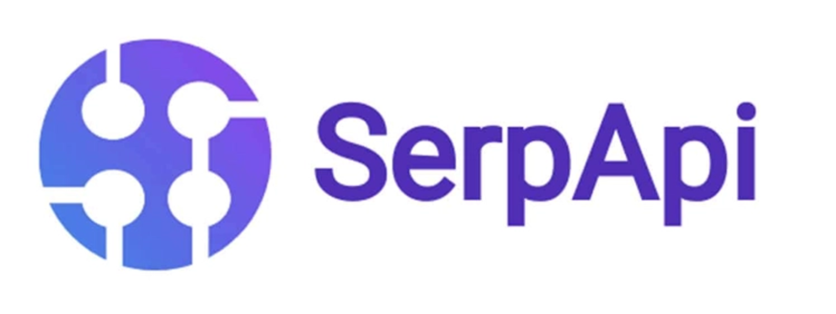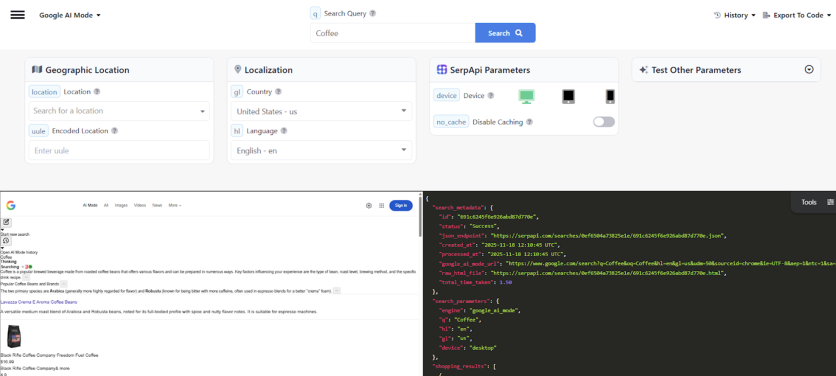
SerpApi
AUSTIN, Nov. 20, 2025 — SerpApi has released a new method for tracking citations using its recently released Google AI Mode API and a Python script. Using the approach, users can enter a list of questions and automatically extract the citation list, which can be used for their preferred use cases.
Founded in 2017, SerpApi's offerings streamline the process of web-scraping. Its APIs help to overcome proxies and CAPTCHAs, returning to users neatly structured JSON results, saving its clients time and effort by avoiding the need to build their own Google scraper or rely on other web-scraping tools.
SerpApi's team also works to maintain all of its parsers and adapt them to changes on the search engine's side, when needed. It also continuously improves its various APIs, of which this new feature is the latest update.

Screenshot: SerpApi's Google AI Mode interface showing a sample search for "Coffee," including parameter configuration, rendered AI Mode results, and the corresponding JSON output
"Google is constantly experimenting with new layouts, new elements, and other changes," says Sonika Arora, a customer success engineer at SerpApi. "By taking care of this for you on our side, we eliminate a lot of time and complexity from your workflow."
SerpApi recently released the Google AI Mode API, which scrapes results from Google's AI Mode. This API makes it easy to retrieve Google AI Mode results programmatically, in a nested JSON format. The newly released API makes it easier to interact with Google's AI Mode. Previously, being one of the top 10 links was the primary focus, but AI Mode has become the new Page 1.
To win the Generative Engine Optimization (GEO) Challenge, content creators need to become a citable source for AI, one that Google AI Mode can synthesize information from. The question is now how one gets cited in AI's answer, and how that can be tracked at scale.
"Unlike traditional SEO, which focuses on ranking individual links, GEO aims to have your content cited and featured within AI-generated answers and conversational responses," wrote Arora. "It involves creating high-quality, well-structured content that directly answers user questions, building brand authority, and ensuring best practices are in place."
SerpApi has now created a means to find and track the cited sources that Google AI Mode uses to synthesize its responses. Users can input a list of desired search questions. The results can be exported to a CSV file. By adding a simple dashboard integration, users can also visualize and chart the data on which domains are winning the most citations in their niche, Arora says.
"By using this simple script, users can measure their performance in AI Mode citations and stay ahead of the evolving search landscape driven by Google's AI Mode," Arora maintains.
According to SerpApi LLC CEO Julien Khaleghy, SerpApi's tools offer access to search results data that have helped other companies create a range of applications, from price monitoring tools and travel information providers to AI models, all of which are protected under US law.
"At SerpApi, we deeply cherish the values defined by the First Amendment," Khaleghy wrote. "We believe the First Amendment is at the core of what defines the United States at its best."
Since its founding, SerpApi has provided search engine APIs that help developers and enterprises retrieve structured search results from platforms like Google, Bing, Facebook, and YouTube. Its technology is used across multiple industries, including SEO, marketing, and advertising, with AI as a large and emerging use case, Khaleghy wrote.
"SerpApi, LLC promotes ethical scraping practices by enforcing compliance with the terms of service of search engines and websites," Khaleghy says. He adds that the company is committed to responsible data handling, user privacy, and accountability in how data is accessed and used.
The SerpApi team has been busy working on new Google APIs this month. They also released a new Google Travel Explore API, which allows structured access to travel destination data from Google Travel, providing detailed information about destinations, including names, countries, GPS coordinates, images, and airport details, along with flight and hotel prices, durations, and airline data.
SerpApi also released a new Google Shopping Filters API, which provides access to the full set of available filters from Google Shopping results, helping users to retrieve filter tokens that can be passed to both the Google Shopping API and the Google Shopping Light API, enabling users to refine product searches by brand, price, material, rating, and other attributes.
"I'm proud of the SerpApi team for delivering yet another cluster of valuable tools that can help our diverse client base," Khaleghy said of the recent releases.
About SerpApi
SerpApi is a leading provider of web scraping and data extraction solutions, offering a suite of APIs that enable organizations to access critical data from the web efficiently and reliably. SerpApi supports open-source software and maintains libraries for developers to help them with their scraping, testing, and AI, such as nokolexbor, turbo_tests, and serpapis-ai-image-classifier.
For more information about SerpApi, please visit www.serpapi.com or reach out at contact@serpapi.com.

-
 C114 Communication Network
C114 Communication Network -
 Communication Home
Communication Home


